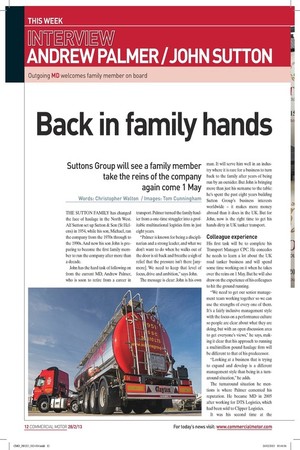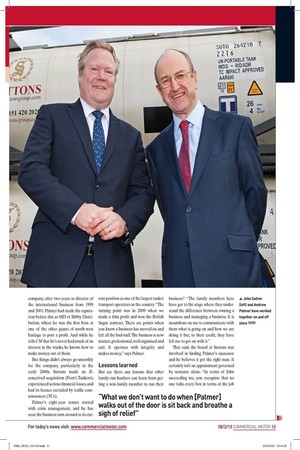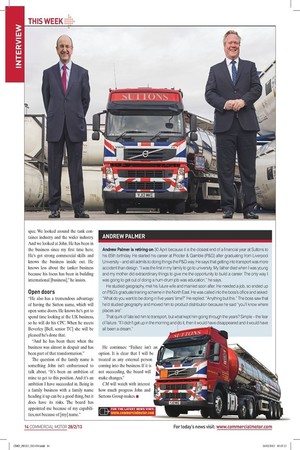ack in family hands I! to
Page 9

Page 10

Page 11

If you've noticed an error in this article please click here to report it so we can fix it.
Suttons Group will see a family member take the reins of the company again come 1 May Words: Christopher Walton / Images: Tom Cunningham THE SUTTON FAMILY has changed the face of haulage in the North West. Alf Sutton set up Sutton & Son (St Helens) in 1954, while his son, Michael, ran the company from the 1970s through to the 1990s. And now his son John is preparing to become the first family member to run the company after more than a decade.
John has the hard task of following on from the current MD, Andrew Palmer, who is soon to retire from a career in transport. Palmer turned the family haulier from a one-time struggler into a profitable multinational logistics firm in just eight years.
"Palmer is known for being a disciplinarian and a strong leader, and what we don't want to do when he walks out of the door is sit back and breathe a sigh of relief that the pressure isn't there [anymore]. We need to keep that level of focus, drive and ambition," says John.
The message is clear: John is his own man. It will serve him well in an industry where it is rare for a business to turn back to the family after years of being run by an outsider. But John is bringing more than just his surname to the table: he's spent the past eight years building Sutton Group's business interests worldwide — it makes more money abroad than it does in the UK. But for John, now is the right time to get his hands dirty in UK tanker transport.
Colleague experience His first task will be to complete his Transport Manager CPC. He concedes he needs to learn a lot about the UK road tanker business and will spend some time working on it when he takes over the reins on 1 May. But he will also draw on the experience of his colleagues to hit the ground running.
"We need to get our senior management team working together so we can use the strengths of every one of them. It's a fairly inclusive management style with the focus on a performance culture so people are clear about what they are doing, but with an open discussion area to get everyone's views," he says, making it clear that his approach to running a multimillion pound haulage firm will be different to that of his predecessor.
"Looking at a business that is trying to expand and develop is a different management style than being in a turnaround situation," he adds.
The turnaround situation he mentions is where Palmer cemented his reputation. He became MD in 2005 after working for DTS Logistics, which had been sold to Clipper Logistics.
It was his second time at the company, after two years as director of the international business from 1999 and 2001. Palmer had made his reputation before this as MD of Bibby Distribution, where he was the first boss at one of the other giants of north-west haulage to post a profit. And while he tells CM that he's never had much of an interest in the trucks, he knows how to make money out of them.
But things didn't always go smoothly for the company, particularly in the early 2000s. Suttons made an illconceived acquisition (Fern's Tankers), experienced serious financial losses, and had its licence curtailed by traffic commissioners (TCs).
Palmer's eight-year tenure started with crisis management, and he has seen the business turn around to its current position as one of the largest tanker transport operators in the country. "The turning point was in 2009 when we made a ibm profit and won the British Sugar contract. There are points when you know a business has moved on and left all the bad stuff. The business is now mature, professional, well organised and safe. It operates with integrity and makes money," says Palmer.
Lessons learned But are there any lessons that other family-run hauliers can learn from getting a non-family member to run their business? "The family members here have got to the stage where they understand the difference between owning a business and managing a business. It is incumbent on me to communicate with them what is going on and how we are doing it but, to their credit, they have left me to get on with it."
That said, the board at Suttons was involved in finding Palmer's successor and he believes it got the right man. It certainly isn't an appointment governed by surname alone. "In terms of John succeeding me, you recognise that no one ticks every box in terms of the job spec. We looked around the tank container industry and the wider industry. And we looked at John. He has been in the business since my first time here. He's got strong commercial skills and knows the business inside out. He knows less about the tanker business because his focus has been in building international [business]," he insists.
Open doors "He also has a tremendous advantage of having the Sutton name, which will open some doors. He knows he's got to spend time looking at the UK business, so he will do his CPC. When he meets Beverley [Bell, senior TC] she will be pleased he's done that.
"And he has been there when the business was almost in despair and has been part of that transformation."
The question of the family name is something John isn't embarrassed to talk about. "It's been an ambition of mine to get to this position. And it's an ambition I have succeeded in. Being in a family business with a family name heading it up can be a good thing, but it does have its risks. The board has appointed me because of my capabilities, not because of [my] name."
He continues: "Failure isn't an option. It is clear that I will be treated as any external person coming into the business. If it is not succeeding, the board will make changes."
CM will watch with interest how much progress John and Suttons Group makes. • Andrew Palmer is retiring on 30 April because it is the closest end of a financial year at Suttons to his 65th birthday. He started his career at Procter & Gamble (P&G) after graduating from Liverpool University— and still admits to doing things the P&G way. He says that getting into transport was more accident than design. "I was the first in my family to go to university. My father died when I was young and my mother did extraordinary things to give me the opportunity to build a career. The only way I was going to get out of doing a hum-drum job was education," he says.
He studied geography, met his future wife and married soon after. He needed a job, so ended up on P&G's graduate training scheme in the North East. He was called into the boss's office and asked: "What do you want to be doing in five years' time?" He replied: "Anything but this." The boss saw that he'd studied geography and moved him to product distribution because he said "you'll know where places are".
That quirk of fate led him to transport, but what kept him going through the years? Simple —the fear of failure. "If I didn't get up in the morning and o it, then it would have disappeared and it would have all been a dream."







































